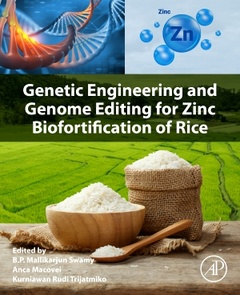Genetic Engineering and Genome Editing for Zinc Biofortification of Rice
Coordonnateurs : Swamy B.P. Mallikarjun, Macovei Anca, Trijatmiko Kurniawan Rudi

MSc in Genetics and Plant Breeding, University of Agricultural Sciences, Dharwad, Karnataka, India;
BSc (Agriculture), University of Agricultural Sciences, Bangalore, Karnataka, India
Professional Experience:
Currently Senior Scientist I-Senior Breeder, IRRI, Los Banos, Laguna, Philippines
Scientist II- Rice Breeder, IRRI, Los Banos, Laguna, Philippines
Scientist I-Rice Breeder, at IRRI, Los Banos, Laguna, Philippines
Postdoctoral Fellow - at IRRI, Los Banos, Laguna, Philippines
Visiting Research Fellow - at IRRI, Los Banos, Laguna, Philippines
Senior Research Fellow (CSIR)- Indian Institute of Rice Research, Hyderabad, India
Junior Research Fellow (CSIR)- Indian Institute of Rice Research, Hyderabad, India
Senior Research Fellow (ICAR) –Indian Institute of Rice Research, Hyderabad, India
Main research topics: Breeding for healthier rice varieties, high beta-carotene, iron and zinc.
Dr. Anca Macovei earned a degree in Biology and a Masters Degree in Plant Genetic Engineering at the ‘Babes-Bolyai’ University in Cluj-Napoca (Romania) followed by a PhD Degree in Genetics and Molecular Biology at the University of Pavia (Italy). Post-doc fellowships were at the International Center for Genetic Engineering and Biotechnology (ICGEB), New Delhi, India and International Rice Research Institute (IRRI), Manila, Philippines Currently, an Assistant Professor at the Department of Biology and Biotechnology (Plant Biotechnology Laboratory), University of Pavia (Italy), main research topics are molecular profiling of seed quality, plant DNA Damage Response (DDR).
Dr. Kurniawan Rudi Trijatmiko earned a degree in Agriculture at the Gadjah Mada University in Yogyakarta (Indonesia) in 1994. Master Degree in Biotechnology at the Bogor Agricultural University (Indonesia) in 2000. PhD Degree in Plant Sciences at the Wageningen Univers
- Compiles the state-of-the-art information to allow fast-track understanding and application of zinc content improvement
- Discusses multiple strategic and methodology approaches
- Includes discussion of the socioeconomic implications of improved rice nutritional value
Date de parution : 06-2023
Ouvrage de 240 p.
19x23.4 cm
Thèmes de Genetic Engineering and Genome Editing for Zinc... :
Mots-clés :
Antinutrients; Background and foreground IP; Base editing; Base substitution; Bioavailability; Biofortification; Biofortified rice seeds; Biosafety; Commercial propagation; Cost-benefit analysis; CRISPR/Cas; CRISPR/Cas9Freedom to operate; Destructive and nondestructive chemical analysis; Direct use; Disability-adjusted life years; Fe-biofortification; Genes; Genetic engineering; Genetic modification or genetically modified (GM)Product life-cycle; Genetically modified crops; Genome editing; Genome-editing; GM crop development; High Zn Low Cd; High-throughput ion analysis; Homology directed repair; Ionomics; IP management; IPR landscape Report; Iron and zinc; Malnutrition; Metal transporters; Micronutrients; Molecular mechanism; Nicotianamine; Non-homologous end joining; Nutritional deficiency; Patent landscape; Philippines.Research and development (R&D)Zinc deficiency; Phytic acid; Prime editing; Regulation; Regulatory pathway; Rice; Safety assessment; Stewardship; Transgenic plants; Transgenic; Transporter; Transporters; Uptake; Vector construction; Vector design; Vitamin A; Zinc biofortification; Zinc deficiency; Zinc transporter; Zinc; Zn homeostasis; Zn mapping; Zn-biofortification



